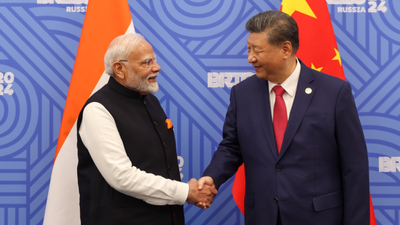ARTICLE AD BOX

NEW DELHI: A day after Chinese foreign minister Wang Yi concluded his two-day visit to India, China’s ambassador to India Xu Feihong voiced strong opposition to the United States’ tariff measures against New Delhi and emphasized the need for closer cooperation between India and China.“US has imposed tariffs of up to 50% on India and even threatened for more. China firmly opposes it. Silence only emboldens the bully. China will firmly stand with India,” Xu said, underscoring Beijing’s willingness to support New Delhi against unilateral trade restrictions.The envoy stressed that the partnership between India and China is crucial for regional and global development. “For two neighbouring countries of such size, unity and cooperation are the only way to achieve common development.
China and India’s friendship benefits Asia. We are the double engines of economic growth in Asia. India and China unity benefits the world at large. India and China have the responsibility to take the lead in promoting an equal and orderly multipolar world,” he said.
Xu further noted that trust-building is essential in the bilateral relationship. “China and India should enhance strategic mutual trust, and avoid mutual suspicion.
Both countries are partners, not rivals. We should manage differences through dialogue,” he said. “We are willing to work with India to enhance development of our strategies and enlarge the cake of cooperation. We welcome all Indian commodities to enter the Chinese market.”Boundary talks and consensusXu’s remarks followed the 24th round of the Special Representatives’ dialogue on the boundary question, which Wang Yi co-chaired with National Security Advisor Ajit Doval on August 19. The Chinese minister also held bilateral talks with external affairs minister S Jaishankar on August 18 and called on Prime Minister Narendra Modi.Xu highlighted ten points of consensus reached in the talks, noting that both sides spoke positively of the progress made since the 23rd round and the implementation of the leader-level consensus reached in Kazan. “The two sides reiterated the importance of maintaining peace and tranquility in the border areas, emphasized handling the issue properly through friendly consultations, to promote overall development of the China-India bilateral relationship,” Xu said.He added that both sides agreed to “take a political perspective of the overall bilateral relationship while seeking a fair, reasonable and mutually acceptable framework for settlement of the boundary question in accordance with the Agreement on Political Parameters and Guiding Principles for Settlement of the China-India Boundary Question signed in 2005.”Among the key outcomes, Xu said the two sides agreed to set up an Expert Group under the Working Mechanism for Consultation and Coordination on the China-India border affairs (WMCC) framework to explore “Early Harvest” solutions on boundary delimitation in appropriate sectors.
They also agreed to create a Working Group under the WMCC framework to advance effective border management.Further, Xu noted that the two sides agreed to “create General-Level Mechanisms in the Eastern and Middle Sectors, in addition to the existing General-Level Mechanism in the Western Sector, and hold the next round of General-Level Mechanism meeting in the Western Sector at an early date.”Trade and river cooperationOn economic and trade ties, Xu said the two countries agreed to reopen the three traditional border trading markets — Renqinggang-Changgu, Pulan-Gunji, and Jiuba-Namgya — and to hold the 25th round of SR talks in China in 2026.Both sides also discussed cooperation on trans-border rivers. Xu said they “agreed to give full play to the role of the China-India Expert Level Mechanism on Trans-border Rivers and keep communication on the renewal of relevant MoUs.” He added that China agreed to share hydrological information during emergency situations “based on humanitarian considerations.”



.png)
.png)
.png)
















 1 hour ago
2
1 hour ago
2









 English (US) ·
English (US) ·